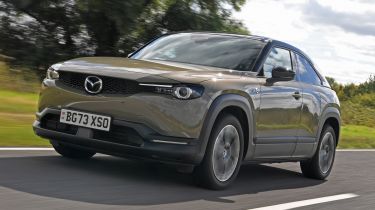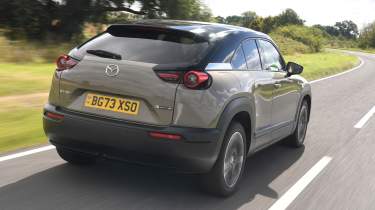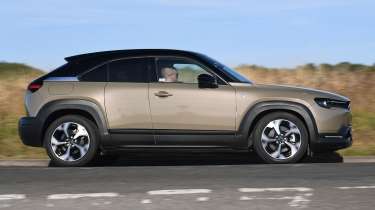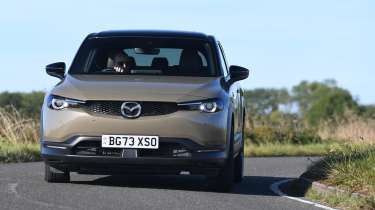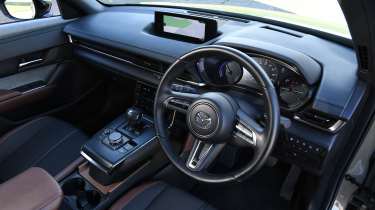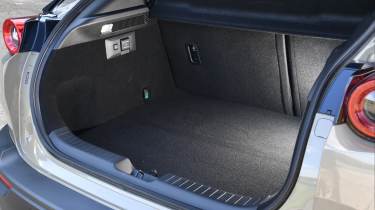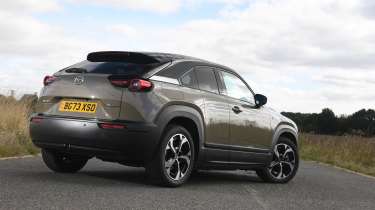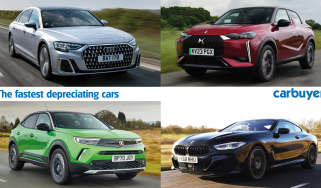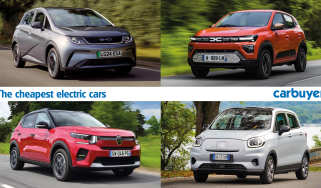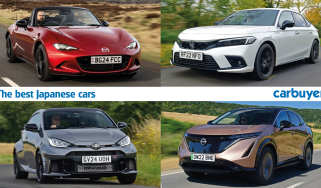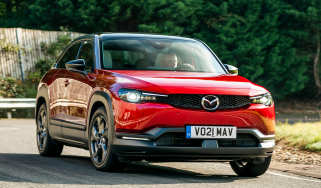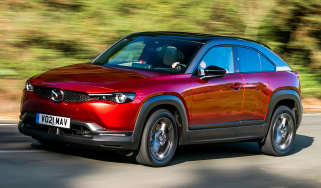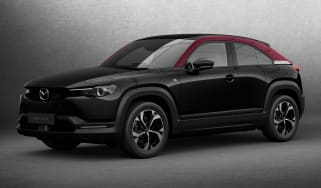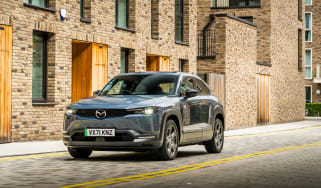Mazda MX-30 review – a fun urban EV with optional range-extender
"The Mazda MX-30 is stylish, fun to drive and affordable, but practicality is compromised"
Pros
- Stylish design
- Fun to drive
- Cheap to run
Cons
- EV version has limited range
- Rivals are more practical
- Could use more power
Verdict – Is the Mazda MX-30 a good car?
The Mazda MX-30 is a quirky but compromised small SUV. It will no doubt win over some buyers with its striking styling, impressive interior quality and enjoyable handling, but its range of just 124 miles feels behind the times. It’s not very practical either, so it’s hard to recommend over today’s affordable electric superminis. That said, the plug-in hybrid R-EV version makes a lot more sense, and it’s not much more expensive than the EV. We think this model is worth considering, so long as you can put up with the cramped rear seats and small boot.
Mazda MX-30 models, specs and alternatives
Looking at pictures of the MX-30, it’s a bit tricky to work out exactly what it is. It has the raised ride height and chunky cladding of other small SUVs, but its proportions are similar to a typical hatchback. Its half-sized rear doors and sloping roofline limit cabin space, meaning it’s not as practical as a Ford Puma, but it’s much bigger than superminis like the Renault Clio.
So what is it? We think the MX-30 is best thought of as an urban runaround alternative with a bit of SUV style. It wasn’t designed to be a truly versatile family car, but instead, a quirky, fashionable machine for snaking through city streets. That becomes obvious when you find out what’s under the skin.
 The 10 best electric cars in 2026
The 10 best electric cars in 2026
The MX-30 is Mazda’s first electric car. The Japanese brand has a reputation for going about things a bit differently, and the same is true for the MX-30’s EV tech. Rather than use a giant battery and aim for a sky-high range figure, Mazda fitted the MX-30 with a dinky 35.5kWh battery. As a result, the MX-30 will only manage 124 miles of range, less than half of many of its rivals. Mazda says this is to help keep production costs down and make the car more environmentally friendly, but it does limit the MX-30’s usability.
Before you discount the MX-30 entirely, Mazda introduced a new model in 2023 that will appeal to a much wider audience. The MX-30 R-EV looks the same from the outside, but it uses a plug-in hybrid system with a rotary petrol engine under the bonnet. The engine acts as a generator to charge up the small battery, enabling an electric-only range of 53 miles and a combined economy figure of 282mpg. You’ll still need to plug it in from time to time to get the most from it, but ‘range anxiety’ is no longer a concern.
Both versions of the Mazda MX-30 are really fun to drive thanks to well-weighted steering and good brakes. The EV only has 143bhp, so it’s not very fast in a straight line – another area in which it’s unlike many electric cars. It takes 9.7 seconds to go from 0-62mph, slower than the 9.0 seconds it takes the Jeep Avenger, and the MINI Cooper Electric feels much quicker off the mark as well. The plug-in hybrid is a fraction quicker than the EV, but there’s not much in it.
If you have a home wallbox charger, the MX-30 EV can be charged in under six hours. Plug either version into a public 50kW rapid-charger, and you’ll get an 80% charge in around 25 minutes.
While the MX-30’s rear seat and boot space are pretty woeful, things are much rosier up front. There’s plenty of room for tall drivers, and the general design and material quality are top-notch. The Mazda MX-30 also bagged a five-star safety rating from Euro NCAP in 2020, with impressive crash-test results across the board.
Plenty of smiles from behind the wheel, an attractive interior and low running costs will impress buyers, but we think the Mazda MX-30 still only appeals to a niche crowd. It’s not the car to go for if you plan to carry passengers regularly – the rear seats are just too cramped – and the EV only makes sense for those doing short journeys. Those in the market for a small, affordable EV will probably be better off with the Citroen e-C3 or Hyundai Kona Electric.
However, we think the MX-30 R-EV makes a lot more sense. The addition of a petrol engine makes it far more usable, and you’ll struggle to find another plug-in hybrid at this price. Rivals like the Toyota Prius may be more spacious and refined, but given that MX-30 R-EV costs thousands of pounds less, it’s well worth considering.
MPG, running costs & CO2
Let’s address the elephant in the room – the Mazda MX-30 is only rated for 124 miles of range. That figure may have been impressive a decade ago, but many of today’s EV will crack 300 miles on a charge. Even the cheaper Citroen e-C3 will manage 199 miles.
That’s because the MX-30 has a relatively tiny 35.5kWh battery. For context, the Peugeot E-2008 gets a 54kWh unit, while the cheapest Hyundai Kona Electric uses a 48kWh unit. Mazda's thinking is that production of larger battery packs is bad for the environment, and that they're heavy, negatively affecting how the car drives. Mazda also points to research that 95% of the MX-30's target buyers drive less than 60 miles a day.
They're the sort of drivers who are likely to tackle the school run, commute to work and drive locally to shop or see friends, rather than regularly travel long distances on the motorway. It's also likely they'll plug the car in overnight at home whenever it's necessary. Still, a 124-mile range means that even the occasional long journey could become a hassle. That’s before considering the effect that cold weather and motorway driving have on EV range.
A full charge takes less than six hours using a 7.4kWh wallbox, but it's also possible to charge the MX-30 at up to 50kW using a public rapid charger. Rivals offer faster charging speeds, but the Mazda’s small battery means that a 0 to 80% top up only takes 26 minutes, which is fairly standard. VED (tax) is currently free for electric cars, which also enjoy the lowest rates for company-car drivers and free entry into low emissions zones like the one covering central London.
But what about the plug-in hybrid MX-30 R-EV? Its battery is around half the size of the EV’s at 17.8kWh, giving it an electric-only range of 53 miles, but it also has a small petrol rotary engine – something of a Mazda speciality. This generates electricity to power the electric motor and top up the battery.You can find out more about this type of ‘range extender’ system by reading our guide to plug-in hybrids.
Official figures claim fuel economy of 282mpg and CO2 emissions of 21g/km. Like all plug-in hybrids, these official figures can be extremely misleading and the figure you actually get in the real world will depend entirely on how much of the time you need the help of the petrol engine.
This became pretty clear during our testing. Starting with a full tank of fuel and fully charged battery, the MX-30 R-EV only returned an average MPG figure in the mid-40s. That’s pretty disappointing, especially when compared to the Toyota Prius we also tested. That car easily returned over 80mpg in the same period.
The MX-30 R-EV is a very different proposition to the EV, and costs more to buy and run. You don’t get the same VED, ULEZ and congestion charge exemptions and company car drivers will pay more in Benefit-in-Kind tax. However, it does at least make the MX-30’s various virtues accessible for those customers who like the car, but can’t live with the EV’s limited range.
Unlike many PHEVs, the range extender supports DC charging, and using a 50kW public rapid charger can top up the battery in 25 minutes. It’s unlikely many people will stop mid-journey, though, as the petrol engine is on hand to help out, and the petrol used probably won’t cost any more than a rapid charge. What’s more, charging the battery using your 7.4kWh home wallbox only takes an hour and a half.
Engines, drive & performance
Let’s deal with the all-electric version first. The 'MX' badge is usually reserved for Mazda's sporty models, such as the iconic MX-5 roadster, so is it deserved here?
Weighing around 1,600kg, the MX-30 is certainly light compared with other electric SUVs, and this pays dividends in almost every driving situation. There's never any feeling of dragging the MX-30 around corners: instead, it's agile and quick to respond, with very little body lean. In fact, we found its handling finesse makes it almost as fun to drive as the smaller MINI Cooper Electric, even if it doesn't have as much punch when you hit the throttle. Its steering is precise and requires just the right amount of effort.
The brakes feel natural, too, which isn’t always a given in alternative fuel cars that harvest energy from braking regeneration. The strength of the electric motor's braking effect can be adjusted on the move via the paddles mounted on the steering wheel. Even in its strongest mode it doesn't quite allow for one-pedal driving, but you can learn to use it to slow the car in predictable traffic, only using the brakes for unexpected stops.
Just don't expect acceleration worthy of 'reaction videos' on YouTube as your friends are pinned back in their seats, Tesla-style. With 143bhp, the MX-30's electric motor feels more on a par with diesel rivals for acceleration, taking 9.7 seconds to get from 0-62mph. Top speed is limited to 87mph. Of course, with just one forward gear and no turbo lag, there is the benefit of smooth progress as soon as you press the throttle. You'll also notice a synthetic engine sound to help make the MX-30 feel natural for drivers.
Things aren’t much different with the range-extender version, introduced towards the end of 2023. It may use one of Mazda’s fabled rotary petrol engines, famed for their soaring revs and prodigious power, but here, it’s focused on efficiency. Besides, the teeny 0.8-litre unit never actually drives the wheels directly: it's simply there to generate electricity for the electric motor that propels the car.
This motor has a smidge less torque than the EV’s, but it does have an extra 27bhp, so it’s a fraction quicker. Although, with 0-62mph taking 9.1 seconds, there’s not a huge amount in it, and the latest Toyota Prius feels a lot nippier. Importantly, the smooth, unbroken acceleration and keen responses are just the same as the EV version’s.
The PHEV is fairly indistinguishable from the EV in other areas of the driving experience, too. It feels just as crisp when changing direction, despite weighing about 131kg more, and while the ride is marginally less compliant over a scruffy surface, it still rides as well as many cars it would consider as rivals.
You can switch between three driving modes: Normal will fire up the petrol engine when the battery drops to 43% to top it up, Charge mode fires up the engine immediately to top the battery up regardless of its state of charge, and EV mode won’t allow the engine to cut in until absolutely necessary. You also have similar brake regen functionality as you get in the EV. The petrol engine stays very subdued when it does fire up, so although it’s not as quiet as the EV on these occasions, it’s still unobtrusive.
That’s until you need to travel at motorway speeds, though. Get beyond 70mph, and the engine’s faint hum turns into more of a drone, which we can only describe as sounding like having your own personal biplane flying above your head. The noise continues until you back off the throttle, or kill the engine by switching to EV mode.
The EV’s suspension is supple enough to ensure the MX-30 feels planted but doesn't bounce or skip uncomfortably around corners, so passengers should be comfortable. The PHEV is a smidge firmer, but it’s still fine. However, the driver will likely wish the rear windows weren't quite so sloping and dark, as they restrict over-the-shoulder visibility when manoeuvring.
Interior & comfort
Mazda has long been known for its striking designs, and the MX-30 is no exception. Its interior follows the brand's recent uptick in quality, adding some striking materials and features into the mix. The centre console trays and door handles are lined with cork from the bark of trees that have fallen naturally – a nod to the brand’s origins making products out of the material – while the door trim incorporates fibres from recycled plastic bottles. There’s even a vegan leather option for interior upholstery.
The only disappointment is some cheap-feeling plastic around the gear selector, and some of the gloss black physical buttons might bother some owners, as they show smudge marks easily.
There’s an 8.8-inch infotainment display neatly nestled into the dashboard of all MX-30s. Unusually, it’s not a touchscreen – instead, you navigate menus using a small rotary controller. It may take you a little while to get used to the controller, especially as Apple CarPlay and Android Auto aren’t really set up to be used like this, but after a while it feels natural.
Whilst the screen is set further back than that in a Jeep Avenger, making it a little hard to read, Mazda’s software interface is clear and easy to navigate, and every MX-30 comes with the built-in sat nav which includes five years of complimentary updates. It’s a shame that Mazda opted for a separate touchscreen display for the climate controls. This feels a bit over-complicated and we’d have preferred physical buttons and knobs from the CX-30.
Trim levels are Prime-Line, Exclusive-Line and Makoto. All models come with the same 18-inch alloys, but the finish is different depending on the trim.
Prime-Line kicks off the range with a generous level of equipment, offering a heads-up display, reverse camera and seven-inch digital gauge cluster plus 8.8-inch infotainment display with sat nav. Mid-range Exclusive-Line adds heated front seats with lumbar adjustment and keyless entry, along with the option of 'three-tone' contrasting paintwork and a brighter finish for the wheels.
The Makoto range-topper features a sunroof, heated steering wheel, 12-speaker Bose stereo and front wiper de-icer, along with a host of extra driver assistance features. All three trims are available on both the EV and PHEV versions.
We’d recommend speccing the optional Soul Red paint colour if you want to stand out – it does cost £1,800, but is a worthy addition that really looks great on the MX-30.
Practicality & boot space
In a nod to the Mazda RX-8 sports coupe, the MX-30 features a set of rear-hinged back doors. It’s an intriguing design, but there are compromises when it comes to functionality. For a start, they aren't as big as most rivals' conventional back doors, and you have to fold the front seat out of the way to get inside. It's also rather claustrophobic in the back of the MX-30, made worse by a lack of knee room and the fact the rear windows can’t be opened. Longer trips will be hampered by low and shallow seat bases that don't provide much thigh support to taller passengers but headroom is adequate.
The MX-30 has a sloping rear profile and stubby tail, with almost no overhang behind the rear wheels, so boot space isn't much better than in a supermini. There's up to 350 litres behind the rear seats in both EV and PHEV versions, including underfloor storage, but this reduces to 332 litres in the range-topping Makoto version due to the need to house the Bose sound system’s large subwoofer speaker. There’s also no dedicated space for the charging cable, so boot space is taken up with the bag that holds it as a result.
It's possible to split and fold the 60:40 rear seats, and space extends to 1,171 litres. But there aren't many clever features like an adaptable boot floor. With the engine bay taken up by the electric motor and/or rotary engine, there's also no 'frunk' like you'll find in some larger EVs.
Reliability & safety
Mazda has an excellent reputation amongst owners, who voted the Japanese brand into seventh place (out of 32 carmakers) in our 2024 Driver Power satisfaction survey. It performed most strongly in categories relating to interior and exterior design. However, practicality was one area where improvement was deemed necessary, with more child-friendly features and more flexible seating common requests. All of this plays rather neatly into the MX-30’s mix of strengths and weaknesses, so we don’t expect this model to change that view anytime soon.
There’s not yet much data yet on how the MX-30 will fare on reliability as an individual model, but Mazda owners that contributed to the Driver Power Survey stated that around a quarter of their cars experienced a problem of some kind within the first year of ownership. The electric version of the MX-30 should be more reliable that a regular combustion-engined car in theory as it has far fewer moving parts. However, this obviously doesn’t apply to the range-extender, and there’s no telling how dependable that all-new engine will be.
The MX-30 is fitted with the latest safety tech, from autonomous emergency braking and lane-keeping, to a system that monitors the driver's attention levels. In the event of an accident, e-Call with GPS can also inform the emergency services while providing them the vehicle's exact location.
It all helped the MX-30 achieve a five-star safety rating from Euro NCAP, with impressive scores of 91% and 87% in the adult and child occupant protection categories, respectively.
